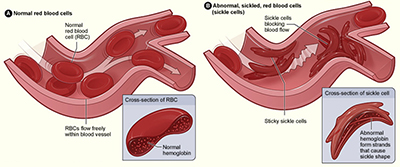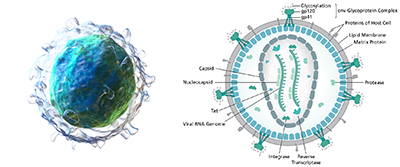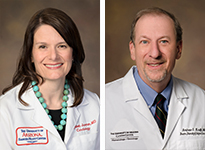Topics for the April 13 presentations in the DOM Research Seminar Series focus on “Bench-to-Bedside Approaches Unravel Inflammatory Mechanisms Underlying Novel Cardiovascular Phenotypes in Sickle Cell Disease” and “The Role of B Cell Follicles in HIV Replication and Persistence.”
 Presenters are:
Presenters are:
- Ankit A. Desai, MD, FAHA, FACC, UA assistant professor of medicine and physiological sciences, Division of Cardiology, UA College of Medicine – Tucson, and member, Molecular Cardiovascular Research Program, UA Sarver Heart Center
- Elizabeth Connick, MD, UA professor of medicine and chief, Division of Infectious Diseases, UA College of Medicine – Tucson
The two were originally to speak in the series June 8, but scheduling conflicts necessitated a move. ![]() Click here [PDF] to view, download, post and share the flyer for this event.
Click here [PDF] to view, download, post and share the flyer for this event.
Dr. Ankit Desai
 A physician-scientist whose research on cardiovascular disparities in minorities with heart failure and pulmonary hypertension is funded by the National Institutes of Health and American Heart Association, Dr. Desai is a non-invasive cardiologist and a translational researcher. His MCRP lab investigates the mechanistic basis of pulmonary vascular disease and associated heart failure. The lab uses a systems biology bench-to-bedside approach for gene discovery and characterization, pre-clinical models of disease, and biomarker identification in humans. With a growing track record of successful trainees mentored by him, he seeks to translate laboratory research into novel therapies and personalized treatment for patients.
A physician-scientist whose research on cardiovascular disparities in minorities with heart failure and pulmonary hypertension is funded by the National Institutes of Health and American Heart Association, Dr. Desai is a non-invasive cardiologist and a translational researcher. His MCRP lab investigates the mechanistic basis of pulmonary vascular disease and associated heart failure. The lab uses a systems biology bench-to-bedside approach for gene discovery and characterization, pre-clinical models of disease, and biomarker identification in humans. With a growing track record of successful trainees mentored by him, he seeks to translate laboratory research into novel therapies and personalized treatment for patients.
Dr. Desai earned his medical degree from the University of Illinois at Chicago, did his internal medicine residency at California Pacific Medical Center in San Francisco, and completed a cardiovascular disease fellowship at the University of Chicago Medical Center. He was previously an assistant professor at the University of Illinois Hospital & Health Sciences System.
Among his most recent publications:
- “Dysregulated Nox4 ubiquitination contributes to redox imbalance and age-related severity of acute lung injury” – Am J Physiol Lung Cell Mol Physiol. 2017 Mar 1;312(3):L297-L308. doi: 10.1152/ajplung.00305.2016. PMID: 28062482
- “Anti-inflammatory properties of amniotic membrane patch following pericardiectomy for constrictive pericarditis” – J Cardiothorac Surg. 2017 Jan 26;12(1):6. doi: 10.1186/s13019-017-0567-7. PMID: 28126025
- “Hyper-activation of pp60Src limits nitric oxide signaling by increasing asymmetric dimethylarginine levels during acute lung injury” – Free Radic Biol Med. 2017 Jan;102:217-228. doi: 10.1016/j.freeradbiomed.2016.11.008. PMID: 27838434
- “Endotoxin- and mechanical stress-induced epigenetic changes in the regulation of the nicotinamide phosphoribosyltransferase promoter” – Pulm Circ. 2016 Dec;6(4):539-544. doi: 10.1086/688761. PMID: 28090296
Dr. Elizabeth Connick
 Dr. Connick is one of the foremost translational physician-scientists on HIV/AIDS—particularly studies of HIV pathogenesis in lymphoid tissues where the majority of HIV replication and CD4+ T cell destruction occurs. Serving on several related national and international research consortiums, she has been continuously funded by the National Institutes of Health for decades. She joined the UA faculty from the University of Colorado Denver in April 2016. In July, it was announced the UA would join 18 institutions participating in a $28 million NIH grant to marshal various immunotherapy advances to create a novel HIV cure strategy.
Dr. Connick is one of the foremost translational physician-scientists on HIV/AIDS—particularly studies of HIV pathogenesis in lymphoid tissues where the majority of HIV replication and CD4+ T cell destruction occurs. Serving on several related national and international research consortiums, she has been continuously funded by the National Institutes of Health for decades. She joined the UA faculty from the University of Colorado Denver in April 2016. In July, it was announced the UA would join 18 institutions participating in a $28 million NIH grant to marshal various immunotherapy advances to create a novel HIV cure strategy.
Dr. Connick is a graduate of Bryn Mawr College, Columbia University and Harvard University, where she earned her medical degree. She completed her internal medicine residency at New York’s Columbia Presbyterian Hospital and her infectious diseases fellowship at the University of Colorado Health Sciences in Denver.
Her most recent publications include:
- “CD4 T Follicular Helper and Regulatory Cell Dynamics and Function in HIV Infection” – Front Immunol. 2016 Dec 27;7:659. doi: 10.3389/fimmu.2016.00659. Review. PMID: 28082992
- “Simian Immunodeficiency Virus-Producing Cells in Follicles Are Partially Suppressed by CD8+ Cells In Vivo” – J Virol. 2016 Nov 28;90(24):11168-11180. PMID: 27707919
- “Follicular Regulatory CD8 T Cells Impair the Germinal Center Response in SIV and Ex Vivo HIV Infection” – PLoS Pathog. 2016 Oct 7;12(10):e1005924. doi: 10.1371/journal.ppat.1005924. PMID: 27716848
- “Suppression of Foxo1 activity and down-modulation of CD62L (L-selectin) in HIV-1 infected resting CD4 T cells” – PLoS One. 2014 Oct 16;9(10):e110719. doi: 10.1371/journal.pone.0110719. PMID: 25330112
The DOM Research Seminar Series
The DOM Research Seminar Series began in September 2016 and occurs on the second Thursday of the month during the academic year, typically pairing a junior and senior investigator from our faculty who are with different divisions to ensure a broad variety of topics are covered.
There has been some juggling of speakers since the series was announced last August, but you can expect to see the following presenters for the balance of DOM Research Seminars this academic year:
 MAY 11:
MAY 11:
- Archita Desai, MD — assistant professor of medicine, UA Division of Gastroenterology and Hepatology, and research associate, UA Liver Research Institute.
- Bhaskar Banerjee, MD — professor of medicine, optical sciences and biomedical engineering, UA Division of Gastroenterology and Hepatology.
JUNE 8:
 Elizabeth Juneman, MD —associate professor of medicine, UA Division of Cardiology; member, UA Sarver Heart Center; UA Reynolds Scholar in Applied Geriatrics, and director of outpatient cardiology services at Banner – UMC Tucson and South.
Elizabeth Juneman, MD —associate professor of medicine, UA Division of Cardiology; member, UA Sarver Heart Center; UA Reynolds Scholar in Applied Geriatrics, and director of outpatient cardiology services at Banner – UMC Tucson and South.- Andrew Kraft, MD —professor of medicine, UA Division of Hematology and Oncology, the Sydney E. Salmon Endowed Chair and director, UA Cancer Center; senior associate dean for translational research, UA College of Medicine – Tucson, and associate vice president, oncology programs, UA Health Sciences.
Dr. Banerjee was scheduled initially to speak at the March 9 seminar, but was rescheduled to allow for Serpil Erzurum, MD, a world-renowned translational scientist on respiratory diseases from the Cleveland Clinic/Case Western Reserve University. Dr. Erzurum spoke on “Metabolism and Hypoxia in Pulmonary Vascular Disease” as a combined event with the final Winter Lung Series Conference. That series is sponsored by the UA Division of Pulmonary, Allergy, Critical Care and Sleep Medicine with the UAHS Asthma and Airway Disease Research Center.
ALSO SEE:
“Final WLSC Speaker Draws Packed House on ‘Pulmonary Vascular Disease’ Talk” | Posted March 10, 2017

